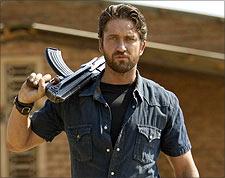Review: Machine Gun Preacher is a compelling film
December 09, 2011 16:08 IST
 Machine Gun Preacher is morally impassive and interesting, writes Shaikh Ayaz.
Machine Gun Preacher is morally impassive and interesting, writes Shaikh Ayaz.
A deep thread of religiosity and personal conflict arising out of faith binds Marc Forster's Machine Gun Preacher, a biographical account of a man truly touched by the divine.
"Helping you kids is about the only good thing I have ever done in this life," Sam Childers (Gerard Butler), an ex-outlaw and currently a missionary, tells a local African kid who, so to speak, appears to have "no idea" what Childers is doing there.
Childers understands how precious life is and how dearly it must be preserved. Strangely, like its title, Machine Gun Preacher is built on contradictions: Childers' earlier life of an aimless outlaw is contrasted with his transformation as a man of God who finds his higher purpose in the rescue of African children. For all its Kalashnikovs, Machine Gun Preacher is humane and pacifist in its outlook, casting a sympathetic look at the doomed fate of a region thriving on war, human trafficking, sex slavery and other crimes.
There's no denying, however, that violence is used here in the name of God -- and implied attempts are made to justify it, too.
Inspired by Childers' memoirs, Machine Gun Preacher begins in prison and ends in paradise (metaphorically). It introduces Childers as an alcoholic and druggie; a man of all evils who is in jail when his ex-stripper wife and daughter undergo conversion to Christianity. The wayward Childers finds religion only under miraculous circumstances, which, to my mind, make up the film's weakest moments.
Nevertheless, from building a church in Pennsylvania to his journey into the heartland of Sudan and Uganda, Childers' life is rocked as much by a sense of personal turmoil (keeping in mind, his obsessive devotion to his born-again beliefs) as by his outer, more physical crusade against the oppressors.
Some of this movie's best scenes are shot on Childers' interaction with orphaned children. He asks a bunch of kids to shut their eyes and leads them by the hand to an undisclosed location. When they open their eyes, they see a park full of swings and carousels. It is in moments like these that Machine Gun Preacher is most engaging.
Childers' character has depth but for some reason an excessive focus on him hinders the film rather than strengthening it. That said, the unique thing about him is that he doesn't think of his crusade as a good deed or the violence employed to reach the end as necessarily a bad deed -- we never get to see his moral self. That's what makes Machine Gun Preacher morally impassive, and interesting.
Forster is a credible filmmaker but somehow under-valued. His Monster's Ball, Finding Neverland, Stay, Stranger Than Fiction and The Kite Runner are uncommonly good films and they, more or less, form his formidable trajectory. He revels in character-driven stories and nowhere is this more apparent than in Machine Gun Preacher. Themes of identity and loss and the struggle one goes through in finding one's real self is a common theme of his cinema.
If you watch Machine Gun Preacher in context of Forster's intrinsic ideas about the human condition, you might end up liking it. It's not great cinema and Forster is no patron saint but it is nonetheless a compelling film evocative of fate and faith; never mind that it is flawed at places you wish it wasn't.
Rediff Rating: 

 Machine Gun Preacher is morally impassive and interesting, writes Shaikh Ayaz.
Machine Gun Preacher is morally impassive and interesting, writes Shaikh Ayaz.